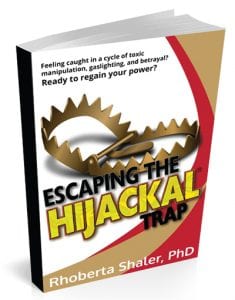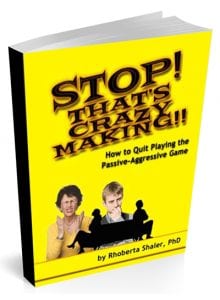Freeing Yourself From Crazy-Making Relationships with Dr. Rhoberta Shaler

The lockdown and quarantine during this pandemic is sure to make a lot of changes in how people live and interact. There are may even be times that you start to think it may be better to start freeing yourself from toxic relationships. Joining Moneeka Sawyer this episode is The Relationship Help Doctor, Dr. Rhoberta Shaler. She talks about the signs to watch out for in determining if your partner is a hijackal and shares her knowledge on what you can do to improve your relationship. She dives into why it’s important not to run away and instead empower yourself and learn how you can divert potentially intense conversations into the neutral zone and create a safe space for you and your children.
—
Listen to the podcast here
Freeing Yourself From Crazy-Making Relationships with Dr. Rhoberta Shaler
I am excited to welcome to the show, Dr. Rhoberta Shaler, PhD. The Relationship Help Doctor. She provides urgent and ongoing care for relationships in crisis. Her mission is to provide insights, information, and inspiration for clients and audiences to transform relationships with themselves and other humans to be honest, respectful, and safe, and always. Even the United States Marines had sought her help. Dr. Shaler focuses on helping the partners, exes, and adult children of the relentlessly difficult toxic people she calls hijackals. She stopped the crazy-making and saved their sanity. She is the author of sixteen books including Escaping The Hijackal Trap and Stop! That’s Crazy Making. She hosts the popular podcast, Save Your Sanity: Help for Toxic Relationships. Her YouTube channel, For Relationship Help has reached over 350,000 views. Dr. Rhoberta, welcome to the show.
Thank you, Moneeka. It’s great to be here.
It’s nice to see you again. Dr. Rhoberta and I were both Icons of Influence at the New Media Summit. We got to hang out for a few days down in San Diego. It was nice to reconnect. Rhoberta, could you tell us a little bit about your backstory? How did you get into this work?
I started out wanting to be a medical doctor from the time I was five. I was born into a family where I had two hijackal parents and I’m an only child. I had the great joy of having both of them focus on me. They didn’t like each other. It was a very interesting childhood. I learned a great deal. I was very much under the spell of all that had happened to me when I was young as every one of us. I had to do a lot of undoing and a lot of figuring out and there wasn’t a lot of help. Once I got my Doctorate in Psychology, I shifted to this specialty because few people understand what’s going on.
Many times when you go for help with your marriage or your relationship, therapists are not familiar with this. They don’t see it quickly. They do the thing that most therapists would do. They would say, “If you only did more.” In actual fact, that is inappropriate when one of the partners is a hijackal because the other doesn’t need to do more. I am slowly learning all of that. There is a lot of unpacking and a lot of taking the tentacles of my soul, and then learning how to help other people do that. That’s the path that brought me to this particular specialty.
It’s appropriate these days because what’s happening is we’re all stuck together in our houses. Even if they’re crazy about each other and love each other, families are driving each other nuts. It is because we’re not used to be in a close-quarters so much for so long. We’ve got families that even they love each other, they are having trouble. They’re not in toxic relationships but they’re turning into difficult relationships. There are parents that are home with their teenage children or their young children that may not be used to hanging out with them that much. It’s on the same side for the children.
You don't have power over others, but you have power over your own processing. Share on XThe statistic that breaks my heart the most is that domestic abuse has gone up by double digits in the United States. I have 100,000 followers to this show and I hope and pray that none of my ladies or their children are going through those issues. Statistically, I know someone’s going to hear this and be like, “That’s me.” The other piece is there are also toxic relationships and those people are now all stuck together. All of that stuff is what I want to talk about and how to deal with that because it’s such a big deal.
Let me add something to what you said, Moneeka. It could be men who are having hijackal partners too. It’s not just the women. There’s an equal number of male and female hijackals. They present a little differently, but there are equal numbers and they’re equally as disturbing and difficult. It’s important to know, but I’ve done three episodes of my Save Your Sanity Podcast on the topic of housebound with a hijackal because people need strong strategies to recognize what’s going on. You get a little relief when people go off to work, or kids go off, or your mother isn’t calling you all the time and she may be the hijackal or your father isn’t being demanding. The whole idea is that you are in your house and if the hijackal is in your house too, you’re going to have trouble with it. Here’s one big reason why. It’s because hijackals have to be in charge. Imagine how crazy they are without being the one who’s calling the shots.
They don’t get to say if they go to work or not. They don’t get to say if their industry is open. They don’t get to say if they can stay home or not. They’ve been told and they don’t like it. There is a whole bunch of underlying tension and resentment just in the fact that they are not in charge. What that does is it increases their charge and you become more of the target. You are the lightning rod for all of their resentment and the children may get that too. That is going to be very unhappy making and very much less than blissful.
Let’s move with that. Tell us what we can do about it. Give us some strategies to help my ladies if they’re in that situation. The reason I keep saying “my ladies” is because this is a women’s show. I am fully aware that sometimes the ladies are the hijackal. I’m not taking sides. A lot of us ladies know we’re toxic. Sometimes we’re so stuck there and we don’t know how to pull out of it. We feel badly sometimes. Some hijackals don’t see it. That’s true for men and women. Some of us though feel it. We’re seeing it more in the way that we relate to our families now. For those of you, ladies, this conversation is interesting because you get to know what the other side of that is like. Hopefully, you can take some strategies away for yourself on how to be less of that person or get the help that you need.
I understood that but I just wanted everybody to know that if you are a lady and you’re reading this, you could be the hijackal treating your man that way. If you understand that you are treating someone that way and you won’t feel bad about it, it’s highly unlikely that you’re a hijackal. It means that you have learned some coping mechanisms from having been raised with one or previously lived with one. We call it having hijackal fleas. You’ve got some fleas leftover in your behaviors. The fact is that if you are cognizant of what you are doing and feel badly about it and want to change it, you do not have typical hijackal traits. Hijackals are not interested in you. They’re only interested in them and what they can get and how they can have power.
If you are in any way aware and conscious that, “I don’t like myself when I do that. It makes other people hurt or feel badly and I don’t like that.” That means that your empathetic mechanism is working and you want to do better, and that’s great. There are a bunch of people in the world who don’t want to do better because the hijackals will tell you outright, “There is nothing wrong with me. I am perfect. If only you were different, we wouldn’t be having this problem.” It’s important to see that distinction. If a person says, “I had a bad day. I behaved badly,” or “I slipped into a way that’s less than loving here. I recognize it and I want to change it,” that means you have empathy. You recognize and you care that somebody else is hurting. You care that maybe you are not presenting a loving face. A hijackal doesn’t care.

Freeing Yourself From Relationships: There’s an equal number of male and female hijackals. They present a little differently, but there are equal numbers and they’re equally as disturbing and difficult.
Thank you so much for that distinction because I know that in conversations I’ve had with you before, it occurred to me that everyone will act like that person. We’ve all had bad days. We all have a piece of us that we don’t love that lashes out and deals with frustration in bad ways. In our last conversation, I remember that and I thought, “Am I a part of that? Is it a real relief that I’m not part of that problem?” I’m sure there are some ladies who might hear this conversation and have the same path. Let’s talk about how to deal with these toxic people if we’re stuck with them.
First of all, you have to recognize what’s something that you can do something about and what you can’t do anything about. What’s in your power and what isn’t? Changing a hijackal is not in your power. They don’t want to change. They see no reason to change. Every time you bring up change, they see it as criticism and they’re not interested. What can you do? You look at your own behaviors and say, “How am I responding to this? Am I responding in a way that is in alignment with who I want to be? They may be bringing out the worst in me or having the most awful thoughts, but who am I being? That’s a big thing.
I have clients all over the world and I always tell them, “The beginning stages are to prepare and practice. You have to see things differently. You have to practice new skills and you’re preparing yourself for making better decisions.” I don’t know if you’re going to stay with the hijackal. Maybe we can do several things that the hijackal will respond to and everything will be better, if not it’s never fine. You also have to change you. Here’s why I say that, Moneeka, and because many of your audience are women. About 70% of my practice is women. They’ll say, “I don’t care if I get anything. I just want to be out of here. I would rather be out of here and not bother with anything.”
I’m going, “Do not do that. That’s exactly what they want you to do.” You need to empower yourself before you leave unless there’s sexual or physical abuse. You need to be that empowered woman. That woman who knows her values, vision for her life, and her belief. She has good communication and conflict management skills. She knows how to set good boundaries and hold them. Have the consequences of them felt before you leave because you want to take that empowered women into your new life. You don’t want to take the one that is broken down, tired, fed up, scared, beam me up, get me out of here. If I have to be in absolute poverty and have to live in some tiny little place with my children, so be it. Sometimes that has to happen because there’s physical and sexual abuse.
If there isn’t, you want to prepare and practice. The things that you see that you have to accept are the first thing. They are not going to change. They’re not interested in change so don’t keep having that conversation. Don’t poke hijackals. It never ends well. Don’t make them angry. Don’t criticize them. Don’t demand or threaten. Don’t do those things. I know you want to because you are frustrated, but don’t do it. You know what you get back, the rage and/or the silent treatment, and the withholding affection, money or anything like that. Accept the fact that you don’t poke a hijackal and then know that you do have some power in your own processing. You don’t have power over them, but you have power in your own processing. Learn to do deep yoga breathing, preferably 4-7-8 breathing purposefully so that you keep yourself in the best state possible, you are as relaxed as possible. You can’t solve a problem when you’re in high tension very well because your body goes into fight or flight.
You’re in a hormone wash that makes things a bit foggy. You want to be as relaxed as you can be in a very tense situation. You want to be able to stay present. You don’t want to go into the, “It’s always like this,” or “It’s never like this.” You don’t want to go into the future, “It’s going to be terrible. It’s always going to be like this.” You need to stay present. “At this moment, I was bound with a hijackal. Let me stay within the parameters of what I can deal with. There’s no point in picking fights. There’s no point in making threats. There’s no point in trying to make big changes now.” What you want is the dullest roar you can possibly have in your home, as quiet as you can make it. Neutralize things. If a hijackal makes a statement that is inflammatory, neutralize it in your head. “That’s what they’re talking about. That doesn’t have to affect me. I don’t have to respond to it. I don’t have to have a comeback.”
Check in with yourself. That you are being how you most want to be. Share on XMany of us women are like, “I’m always the one that has to change. I’m always the one that has to take responsibility.” It can be frustrating. What I would want to say here is you’re changing and taking responsibility for you. You’re not doing it for the benefit of this abusive person. You’re doing it for the benefit of you and your children. Sometimes it’s frustrating that you’re in a relationship where you’re responsible for everything. Remember that this is about empowering you. This isn’t about making someone else right. It’s not about condoning anybody else. It’s not about saying, “I am throwing your arms up in there and saying, ‘Fine, I give up.’” It’s none of that stuff. This is about empowering yourself so that you can keep yourself and your children safe. That’s what this is about.
As I was hearing this and hearing, “You need to change,” it is true and Rhoberta says it very kindly, but I know that some of us through our filters are like, “Really, again? It’s all about me having to change?” We have these feelings. This is about empowering yourself because unless you do it, you’re going to get more abuse. Your children are going to suffer. The dog may suffer. Suffering happens more unless you’re willing to take responsibility to empower yourself to deal with things. Wouldn’t you agree?
I do and it’s a good point. I would like to emphasize it by saying, “Yes, I understand. It’s not fair. You always have to take the high road. You always have to be the one who understands. You always have to be the one who accommodates.” However, what we’re talking about here when I’m talking about what Moneeka highlighted. This is you growing into the strong, powerful and empowered woman that you would like to feel like. It’s a personal growth pattern. It is not saying, “I have to change because of the hijackal.” It’s saying, “I’ve got this in front of me. I don’t like it. How can I do my bit and come into a wonderful space where I know I’ve got my stuff together? I am being who I want to be. I have good skills. I can quietly say what’s so for me.”
We were talking about my books. In the Kaizen for Couples books that I wrote, I put in there a technique that I created many years ago called the Personal Weather Report. That’s got to be one of the most powerful things I can ever teach anyone. It’s how to speak in a way that is assertive and feel good about it. I’ll give you my definition of assertiveness. It means that you come to a place where you honestly believe that you deserve to take up space and draw breath on this earth. From that place, you learn to say, “I have the right then to say what I think, feel, need and want as long as I do not mention another human by name or pronoun.” If I get in the habit of doing a Personal Weather Report where I speak about what’s so for me, not mentioning another human by name or pronoun, I can be assertive because I know what I think, feel, need, want and remember. As long as I am not talking about anybody else, I have the absolute right to do that. That’s the first way to prepare. It’s to change your communication.
Can you give us an example of that?
You might want to say, “Nobody respects me around here. When you do that, it simply drives me crazy. You’re doing it on purpose and I hate it so change.” That’s not going to help.

Freeing Yourself From Relationships: If you understand that you are treating someone wrong and you feel badly about it, it’s highly unlikely you’re a hijackal.
That’s our normal response.
If I sent her myself and I say, “I find that I do better in a place where I feel there’s respect. At the moment it doesn’t feel like that to me, what would help me is this.” I clearly take responsibility for the fact that I’m not feeling it. I am communicating what would help me feel better and then say, “Would that be possible?” You then can get agreement or no agreement or the silent treatment, but you are beginning to say, “I can only deal with my inner self. I can say what’s so for me. I could put it out there.” I can then ask if I can have that agreement to operate between us in that way. I can then learn something about the other person. If I train myself to use the Personal Weather Report, it sounds simple but it’s not easy.
It is not what we’ve been raised to do and this is basic to take back your sense of being an empowered woman. I know I can count on myself to say something I won’t regret. I can say something that’s true for me. I can say something that if someone doesn’t believe it, that will give me information about them. They don’t want me to be like that. They want me to change. They want me to be different. They want to judge how I am. I’ve already checked in with myself that I am being how I most want to be. I’m living from my values, my vision from my life, my beliefs, and my next best steps.
Thank you, Rhoberta. That was amazing.
Back in the day, I was training teachers. I was going all over the province of British Columbia training teachers. That was back in the day when people thought that “I message” was a stellar way to solve problems and it caused my gut to go, “I don’t like that.” For people reading, an “I message” was, “I feel this way when you do that.” That’s just bail blame. Maybe it was an upgrade from screaming and yelling at what an idiot you are. Maybe there was a middle ground there, but it caused me to develop the Personal Weather Report as a respectful thing. We are the experts on what’s going on here. The other person is not the expert on what’s going on in here. If I simply say, “I care enough to tell you what’s going on in here and I lay it out and then I watched. Do you pick it up or are you curious about it? What do you do with it? Do you get angry about it? Do you refute it?” That will give me information about the other person.
If I’m in a fog, which hijackal wants to keep you in the fog. Susan Forward wrote a book a long time ago called Emotional Blackmail. In there, she talked about FOG as an acronym for Fear, Obligation, and Guilt. That’s where they want to keep you. If you have heightened anxiety, which certainly happens when you’re housebound with a hijackal especially if you have a few kids thrown into the mix, you already are washing chemicals. You then have somebody who wants fear, obligation, and guilt to pile on that and they can’t be wrong so that you must be, what a horrible soup you’re living in. For you to be able to step back and say, “Who do I want to be right now?”
Don't be marginalized, isolated, excluded, demeaned. Stand up, not in a confrontive way, but in a positive, affirmative way. Share on XAll I can do is say who I am, what’s going on within me, give a Personal Weather Report, and watch what they would do with it. A hijackal will have very little interest, but here’s where it provides some effectiveness. It’s when a hijackal gaslights you. That means that the hijackal tries to tell you what you think, feel, need, want, remember, all of that. They want to define your reality for you. They’ll say something like, “I know you better than you know yourself and this is what it is.” When you’re practiced in the Personal Weather Report in that instance, you can come back and you can say, “That’s not how I feel. I’m happy to tell you how I feel if you’re interested in inquiring.” That brings everything into this neutral ground. The hijackal doesn’t like it but they’re not going to go ballistic.
You just say, “I’m happy to tell you, but that isn’t how I feel.” When you start to do that, you start doing it internally. You start practicing it internally. You then start saying it quietly, genuinely and neutrally. You start to get a little bigger in the situation. You start to open up a little stronger and you grow into more sense of, “I have the right to exist. I have the right to take up space. Therefore, I have the right to be assertive.
This whole thing about us taking space. One of the bliss practices is owning your footprint to knowing that you have the right to that footprint. God put you here to take that footprint. It is interesting that you talk about even having a right to breathing air. There are people out there that have that feeling. Thank you so much for that.
Let me give you a little visual. This is a poorly, quickly drawn one but I’ll give it to you anyway. This is a healthy relationship.
It’s a yin and yang.
It is a beautiful balanced yin and yang sign. However, in a hijackal relationship, it looks like that, which is a huge one side and a tiny marginalized, isolated pushed to the edge of the other’s side. That will continue. What I’m inviting you to do in this empowerment is to come back and fill your half of the space. Don’t be marginalized, isolated, excluded, demeaned, discarded, devalued, and let that continue. Stand up not in a confrontative way, but in a positive and affirmative way.

Freeing Yourself From Relationships: Escaping the Hijackal Trap: Volume 1 – The Truth About Hijackals and Why They Are Crazy-making
Do you have any other advice for maybe how to protect your children or how to create a safe space within your home with everything that’s going on?
It’s difficult if you have a hijackal because when they’re agitated, they do what I call Personal Surveillance. They go to the rooms you’re in. They blow up your phone. They want to know where you are. They want to know what you’re doing. They want to know why you’re doing it. They want to tell you shouldn’t be doing it. You may have to carve out internal space because you can’t find it in physical space. Preferably, find some physical space. Go outside in the yard, do something, and have some time to breathe. I mentioned the 4-7-8 breathing. That breathing through your nose as fully as you can for a count of 4, hold your breath for a count of 7, exhale through your mouth as completely as you can for a count of 8 and repeat. What this does is it re-oxygenates your system. It helps you get rid of carbon dioxide.
That will allow you to relax. It will allow your muscles to relax. It will allow you then to be able to think more clearly. You can practice that even while you’re in the middle of a conversation or you’re simply smiling. You can exhale while you’re talking or smiling. If somebody is agitated in front of you, you can practice that purposeful breathing. Also, if you have children, everybody’s a little agitated. Have a designated space in your home for everybody if you possibly can. If they don’t have their own bedrooms, let them have their own sacred corners where when they’re in that, nobody can come in. Therefore, you will be accorded that rate too. The hijackal is constantly going to trespass, but you keep saying, “No, this is my space. Please step out.”
You begin to have some physical boundaries. They may not be walls but they are, “This is my corner. I’m having a quiet time now.” Those are important practices. Children have both your DNA and I want to address the children. Children’s brains grow until they’re 30 years old. The strongest and largest growth capacity is before the age of 5 or 6. Up until that time, children are taking everything in emotionally. They’re figuring out how to get their needs met. They learn whether you come when they cry. They learn when you smile at them. They learn when they smile at you, do you smile back? How do they get your attention? What do they have to do? They’re learning all kinds of things that are survival because as humans, we are not like cows or horses. We don’t get spit out of our mothers and licked off, and then we leap up and run around the meadow.
We know that we’re loved. Intrinsically, we know that we need those giants in order to be transported, to be fed, and to be taken care of. We’re coming from that premise. How do I get them to take care of me? Because we’re emotional beings at that time, primarily we are learning who we are by whether or not they take care of us or how interested they are in us. That is locked in there. When you’re dealing with your children, they have one side coming from the hijackal, which is telling them that their only value is when they make the hijackal happy or look good. I know you don’t want the extra work, but you’re with the hijackal so it comes with the territory. You have to balance it out by being very interested, validating, and present with the children.
When they complain about daddy, you say, “I know you’re feeling such and such. You’re feeling this way.” You legitimize and validate their feelings without making daddy wrong because that’s not going to work. That’s going to come back to hunt. I was working with a client whose children are 8 and 5. The eight-year-old has already been taught by the father to spy on the mother. She has been told repeatedly that she needs to repeat every conversation that she hears the mother is having to him when he gets home. I had a situation in my office and a woman’s babysitter bailed. She came in for a session. She had to bring her 1-year-old and her 5-year-old. Her five-year-old was sitting outside the door with the door cracked and he had an iPad. The little one was with me.
Recognize what's something you can do something about, and what you can't do anything about. What's within your power, and what isn't. Share on XI watched the five-year-old insert himself around the door. A couple of times, we told him to go back out. The third time, he came in and kept edging towards mom. He then had what I call the hijackal smirk on his face. It’s that clear, superior, “I got you” look. He looked at me and he said, “I’ve recorded everything you said.” I said, “Come and show me your iPad.” He showed it to me and I said, “Where did you record it?” He showed it to me. “How did you learn to do that?” “My daddy gave me this and he told me to record everything and send it to him.” I said, “That’s interesting,” and I erased what he had recorded.
I was hoping you would push delete.
I said, “I’m sorry, but you can’t do that here.” This is the way they operate. If you’re with a hijackal, you have to do some double duty. That’s just the way it is until you practice and prepare to decide if you’re going to stay with that hijackal. Now, you’re not going anywhere because the courts are backed up and they’re working virtually. Some of them are closed and nothing’s going to happen. It is very important for you to understand what it is you’re telling those children and you are responsible for that balancing act. You don’t make the partner wrong. You validate the children’s feelings and you ask them, what would work better for you? What do you think you could say when that happens? You do some practicing with them. If you happen to have a resentful teenager, I did a Facebook Live not long ago with Aaron Huey from Fire Mountain Programs for teenagers who were troubled. We did a great thing about how to manage teenagers. I highly invite everybody to listen to that. It’s on my YouTube channel. My YouTube channel is For Relationship Help. There’s a whole Facebook Live stream there with Aaron Huey on Cooped Up With Unhappy Teenagers.
Rhoberta, normally I would say, “Let’s go into an EXTRA,” but you have already given some deep, impactful stuff. I don’t feel like we need to move into that other section, but I’m in complete awe. Thank you so much for all you’ve offered.
You’re welcome. Thanks for the great questions. I know how difficult it is if you are housebound with a hijackal. If you’re not housebound with a hijackal because even though they’re not there, they want you to be housebound or at least attached to them by the hip. They want to know where you are, what you’re doing and then they make up a whole lot of bad things that you didn’t do or think, and then they blame you for that. Do get the help that you need if any of this is making sense and what’s happening at your house.
How can people get in touch with you?

Stop, That’s Crazy-Making!: How to quit the Passive-Aggressive game
Go to TransformingRelationship.com. That’s the easiest thing to do. Also, you can arrive there by going to ForRelationshipHelp.com. You can see all this there for you. I have a membership program. You can have a one-hour full session as a new client for only $97. It’s all there for you. It will also lead you to the podcast and the YouTube channel.
You also have books. Those are also available on Amazon.
They’re both in print form and in eBook form. On my website, there are courses and webinars and all kinds of things to help you on your journey.
Ladies, this can be difficult, so now you’ve got a resource. If you’re needing some help, even if you don’t have the privacy to make a phone call, you can still read books. You can still take coursework. You can do some things for yourself. Make sure you reach out to Rhoberta and get some of that information.
If you’re stuck, I also have a Facebook group and you can find it. It’s called Optimize Life After Emotional Abuse.
Rhoberta, that was truly an amazing episode. Thank you so much for all you offered my ladies.
You’re welcome. Thanks for having me.
Ladies, thank you so much for joining Rhoberta and me for this show. Always remember, bliss is your birthright. Choose to live your bliss every single day. I’ll see you soon.
Important Links
- Dr. Rhoberta Shaler
- Escaping The Hijackal Trap
- Stop! That’s Crazy Making
- Save Your Sanity: Help for Toxic Relationships – podcast
- For Relationship Help – YouTube Channel
- Kaizen for Couples
- Emotional Blackmail
- Fire Mountain Programs
- Cooped Up With Unhappy Teenagers on YouTube
- TransformingRelationship.com
- ForRelationshipHelp.com
- Optimize Life After Emotional Abuse – Facebook group
About Rhoberta Shaler, PhD
 Rhoberta Shaler, PhD, The Relationship Help Doctor, provides urgent and ongoing care for relationships in crisis. Her mission is to provide the insights, information, and inspiration for clients and audiences to transform relationship with themselves and other humans to be honest, respectful, and safe in all ways. Even the United States Marines have sought her help!
Rhoberta Shaler, PhD, The Relationship Help Doctor, provides urgent and ongoing care for relationships in crisis. Her mission is to provide the insights, information, and inspiration for clients and audiences to transform relationship with themselves and other humans to be honest, respectful, and safe in all ways. Even the United States Marines have sought her help!
Dr. Shaler focuses on helping the partners, exes, and adult children of the relentlessly difficult, toxic people she calls Hijackals® to stop the crazy-making and save their sanity.
Author of sixteen books including Escaping the Hijackal Trap and Stop! That’s Crazy-Making, she hosts the internationally popular podcast, Save Your Sanity: Help for Toxic Relationships. Her YouTube channel, ForRelationshipHelp, has reached over 350,000 views.
Get Dr. Shaler’s free EBook: “How to Spot a Hijackal” at https://www.forrelationshiphelp.com/help-handling-hijackals-spot-signup/
To listen to the EXTRA portion of this show go to RealEstateInvestingForWomenExtra.com
——————————————————
Learn how to create a consistent income stream by only working 5 hours a month the Blissful Investor Way.
Grab my FREE guide at http://www.BlissfulInvestor.com
Moneeka Sawyer is often described as one of the most blissful people you will ever meet. She has been investing in Real Estate for over 20 years, so has been through all the different cycles of the market. Still, she has turned $10,000 into over $5,000,000, working only 5-10 hours per MONTH with very little stress.
While building her multi-million dollar business, she has traveled to over 55 countries, dances every single day, supports causes that are important to her, and spends lots of time with her husband of over 20 years.
She is the international best-selling author of the multiple award-winning books “Choose Bliss: The Power and Practice of Joy and Contentment” and “Real Estate Investing for Women: Expert Conversations to Increase Wealth and Happiness the Blissful Way.”
Moneeka has been featured on stages including Carnegie Hall and Nasdaq, radio, podcasts such as Achieve Your Goals with Hal Elrod, and TV stations including ABC, CBS, FOX, and the CW, impacting over 150 million people.

